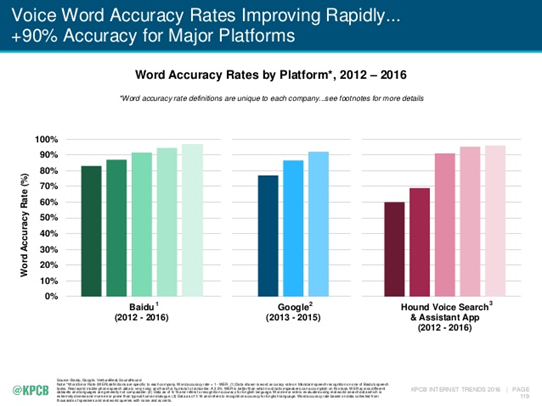Yes, you heard me – I said VOICE SEARCH SEO!
 A voice search on Google often results in a dictated direct response. Better that than a bunch of links to more or less relevant sites. When Google knows where you are and understands your query the search results can be staggeringly effective.
A voice search on Google often results in a dictated direct response. Better that than a bunch of links to more or less relevant sites. When Google knows where you are and understands your query the search results can be staggeringly effective.
It’s not that long ago that Google buzz was all about mobile. Now, mobile is becoming the primary platform for search and shopping. And users are increasingly expecting to speak directly to their devices while on the go. 20% of search queries on mobile in the US are now voice-based. This, according to remarks by Sundar Pichai, Google’s CEO, last May at Google I/O. There he also announced launches of the new Google Home device, the Allo messaging app, and other new voice-driven applications and devices.
“OK, Google! Find an eye glasses store near me!” “Siri, where’s the nearest Korean restaurant?” “Play Sergeant Pepper’s!” “What’s the weather today?”
Whether it’s Google Now, Google Home, Siri, Alexa, or even Cortana, we are all talking to our devices like never before. And accuracy of results is dramatically better than just a year or two ago.

Top Voice Search Strategies for 2017

Man Using Internet Voice Search Technology On Mobile Phone
People use voice search when they are driving, biking, walking, watching TV, while cooking, etc. They use it when they need a quick answer now and they are busy or occupied in some way, and not in front of a desktop. They use it at meal time or at parties. It’s often fun (sometimes annoying), always convenient, easy, and fast. The percentage of searches performed by voice is growing all the time. This will help you understand the SEO implication for your site and how to prepare for the coming change.
Mobile Now
Be sure your site provides an amazing mobile experience – if you haven’t yet. The better the responses, the more people will speak their queries to Google. To compete in that world, you must build for mobile first.
Local SEO and Voice Search
If you have a local business with brick and mortar locations, these are ripe for voice search. Be sure to super optimize your local SEO footprint. Maintain and optimize your Google My Business listing, and check that you appear on Google maps accurately. Check that your NAP (Name, Address, and Phone) info are correct. Select the best categories. Conduct a review of your site’s local listings. Consider a tool like Yext (we can help!) to add citations and enhance accuracy across multiple directories and listings.
Use Structured Data
Use structured data where possible to give Google as much information as you can about the content on a page. Check schema.org to learn more and find the right schemas. The better Google can understand and categorize your content, the better the odds of ranking in general. And this content will be a better candidate for voice search results.
Content and Featured Snippets
Google’s accuracy in interpreting user intent is frightening. When you speak your question into your phone, or into your Google Home appliance — “OK Google!” — Google will often serve a spoken response from a featured snippet! No list of choices and guesses, just one featured answer. You should be writing for featured snippets whenever possible. Learn what sites and pages are winning the featured snippet space, and for what types of queries. Take pages where you already rank on page 1 or page 2 and build them up. Rewrite them to answer specific, popular questions as clearly and succinctly as possible. Add supporting information. Add some internal links and seek out some external links. These pages may pay you back for the effort many times over.
Multi Word Search Phrases
Think about how your users and prospects search. Answer as many questions as you can in your content. Target long search phrases. People use voice searches differently than when they type a search into Google. As noted above, voice search queries are more natural, and more specific, with the expectation that the first answer will be the best one. Design your content with that in mind.
Ecommerce and Voice Search
If you run an ecommerce site, consider voice search ramifications as well. Write your category and product content with voice searches in mind. Same with your informational content and blog posts. Think beyond specific keyword phrases and explore natural language searches in your industry. Think about how users query at different stages of the buyer’s journey. Write “How-to” content. Dig in to your analytics for on-site searches your visitors perform when looking for a product or a solution. Build content around those search phrases. And wherever you can, create content that answers popular and obvious questions! You’ll help your users, and you’ll help Google, and you’ll build more traffic, too!
We suggest you watch this space. Voice search is in its infancy. And it’s already changing everything. Let us know if we can help with your strategy. Until then, “OK Google, surprise me!” (try it!)












